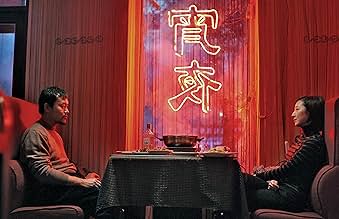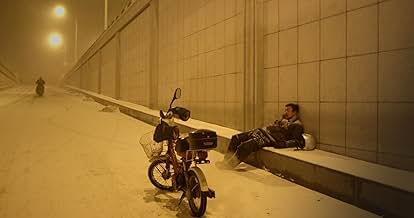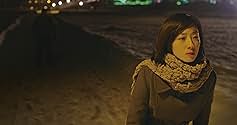IMDb रेटिंग
6.7/10
10 हज़ार
आपकी रेटिंग
एक पूर्व पुलिस कर्मचारी और उसके पूर्व साथी ने हत्याओं की उस श्रृंखला की जांच करने का फैसला किया, जिसने उन्हें शर्मिंदा कर उनके करियर को समाप्त कर दिया था, जब हुबहू वैसी ही हत्याएं फिर शुरू ह... सभी पढ़ेंएक पूर्व पुलिस कर्मचारी और उसके पूर्व साथी ने हत्याओं की उस श्रृंखला की जांच करने का फैसला किया, जिसने उन्हें शर्मिंदा कर उनके करियर को समाप्त कर दिया था, जब हुबहू वैसी ही हत्याएं फिर शुरू हो जाती हैं.एक पूर्व पुलिस कर्मचारी और उसके पूर्व साथी ने हत्याओं की उस श्रृंखला की जांच करने का फैसला किया, जिसने उन्हें शर्मिंदा कर उनके करियर को समाप्त कर दिया था, जब हुबहू वैसी ही हत्याएं फिर शुरू हो जाती हैं.
- पुरस्कार
- 28 जीत और कुल 46 नामांकन
फ़ीचर्ड समीक्षाएं
OK, so yes - this is a very slow burn a times with far too many establishing and shots of decaying urban industrialisation, but when the action does actually focus on the story it's not a bad crime drama at all. We start with an arm sticking out of a pile of coal. The cops arrive and "Zhang" (Fan Liao) is soon on the case. He can only identify the corpse, though, and unimpressed his bosses ensure that five years down the line he is reduced to working as a security guard with a penchant for the bottle too. What we now know, though, is that there were a series of such killings and they are now under his fingernails. He is obsessed with identifying the killer. Reuniting with his for partner "Liang" (Xuebing Wang), they pick up a trail that leads them to the enigmatic "Wu Zhizhen" (Gwei Lun-Mei). "Zhang" now vacillates between an attraction to this woman and to suspecting her, but has she anything to do with the crimes? It's a curiously developed film, this. It proceeds in fits and starts before a denouement that is rushed and rather unfulfilling. It looks gritty and dark, the weather - cold and miserable, also helps to create an atmosphere and the acting is competent. Maybe it could lose twenty minutes of preambling characterisations, but it has a solid story with director Yi'nan Diao getting close to the the best from Fan Liao and his lumps of coal.
This 2014 Golden Berlin Bear winner (with a rare second Silver Berlin Bear award of BEST ACTOR for Fan Liao) is Chinese director Yi'nan Diao's third feature, and his first to be shown in cinemas and harvested over one hundred million RMB, roughly equivalent to 16 million dollars, thanks to the international accolades it received. Its original title can be translated verbatim as "White Day Fireworks", it is the name of a nightclub which would be revealed as a crucial thread to a murder case, furthermore Diao arranges a literal daytime firework show to climax the film in the coda, meanwhile, its official English title: Black Coal, Thin Ice, betrays the locations which relation all the murder cases during a five-year span.
The film starts in 1999, in an unspecified city in China's North-east province Heilongjiang, Zhang (Liao) is a recently-divorced policeman, during a fresh case of a dismembered body scattered in sundry collieries where an I.D. card indicates the dead is Liang (Xuebing Wang), but due to his negligence, two fellow policemen are killed in operation while Zhang is also wounded. After that, the time jumps to 2004, now Zhang is a life-beaten drunkard and works as a security guard, two new dismembered bodies have been found, all link back to Liang's wife Wu (Gwei), whose mysterious mien attracts Zhang, he embarks on a personal investigation to follow her, strike up a conversation with her in the dry-cleaner where she works, and eventually ask her out for an ice-skating date. But at the same time, danger is lurking around him too, is Liang really dead? Or is Wu as innocent as she looks? Can all the mysteries be brought into daylight in the end or is there another lie involved? Diao smugly leaves an semi-opening end with many spurious clues (e.g. the cremains Wu buried under the tree Vs. her apparent lie of discarding it over the sea during the inquiry), to prompt viewers for disparate interpretations.
This film is to a great extent inscribed as an art-house fare with its lurid background or foreground colour embedding in almost every scene, the visual palette is meticulously chosen and also overtly, Diao is a faithful apprentice of symbolism, from a battered ladybug on the bedsheets in the opening sequence, to an abrupt introduction of a deserted horse left by junkmen, until the firework finale reaches the hallmarks of its veiled fatalism pretentiousness buried in his not-so-justifiable script, there must be a more plausible reason behind a redemption by right of admitting a murder one might not execute, it unfortunately gives an impression of a desperate trick to glaze over the banality of the story, to romanticize the damsel-in-distress reverie.
The whole story is a dancing-on-the-edge between a sex-driven anti-hero and a irresolute femme fatale, with a jarring red herring which leads to nowhere. But the two leads are giving fantastic performances, Fan Liao breathes out the irascible mentality stinkingly inflicted on a non-starter who clings to the last straw and strives to feel the ardor of living again. While Lun Mei Gwei from Taiwan, may seem to be an odd choice for a North-east girl, heedfully, she doesn't have many lines to give away her southern accent, instead, relies on her body language and facial expressions, her air of mystique is the most enticing feature entraps audience even in the film's banalest moment.
Winning over the likes of BOYHOOD (2014, 8/10) and THE GRAND BUDAPEST HOTEL (2014, 8/10) in Berlin inevitably becomes an over-achievement for this intense crime-thriller, but put it among its Chinese peers of the same year, the film can excel most of them hands down, as one of the must-see from the over-ballooning market where ingrainedly burdened with shoddy soil damages its own commodities.
The film starts in 1999, in an unspecified city in China's North-east province Heilongjiang, Zhang (Liao) is a recently-divorced policeman, during a fresh case of a dismembered body scattered in sundry collieries where an I.D. card indicates the dead is Liang (Xuebing Wang), but due to his negligence, two fellow policemen are killed in operation while Zhang is also wounded. After that, the time jumps to 2004, now Zhang is a life-beaten drunkard and works as a security guard, two new dismembered bodies have been found, all link back to Liang's wife Wu (Gwei), whose mysterious mien attracts Zhang, he embarks on a personal investigation to follow her, strike up a conversation with her in the dry-cleaner where she works, and eventually ask her out for an ice-skating date. But at the same time, danger is lurking around him too, is Liang really dead? Or is Wu as innocent as she looks? Can all the mysteries be brought into daylight in the end or is there another lie involved? Diao smugly leaves an semi-opening end with many spurious clues (e.g. the cremains Wu buried under the tree Vs. her apparent lie of discarding it over the sea during the inquiry), to prompt viewers for disparate interpretations.
This film is to a great extent inscribed as an art-house fare with its lurid background or foreground colour embedding in almost every scene, the visual palette is meticulously chosen and also overtly, Diao is a faithful apprentice of symbolism, from a battered ladybug on the bedsheets in the opening sequence, to an abrupt introduction of a deserted horse left by junkmen, until the firework finale reaches the hallmarks of its veiled fatalism pretentiousness buried in his not-so-justifiable script, there must be a more plausible reason behind a redemption by right of admitting a murder one might not execute, it unfortunately gives an impression of a desperate trick to glaze over the banality of the story, to romanticize the damsel-in-distress reverie.
The whole story is a dancing-on-the-edge between a sex-driven anti-hero and a irresolute femme fatale, with a jarring red herring which leads to nowhere. But the two leads are giving fantastic performances, Fan Liao breathes out the irascible mentality stinkingly inflicted on a non-starter who clings to the last straw and strives to feel the ardor of living again. While Lun Mei Gwei from Taiwan, may seem to be an odd choice for a North-east girl, heedfully, she doesn't have many lines to give away her southern accent, instead, relies on her body language and facial expressions, her air of mystique is the most enticing feature entraps audience even in the film's banalest moment.
Winning over the likes of BOYHOOD (2014, 8/10) and THE GRAND BUDAPEST HOTEL (2014, 8/10) in Berlin inevitably becomes an over-achievement for this intense crime-thriller, but put it among its Chinese peers of the same year, the film can excel most of them hands down, as one of the must-see from the over-ballooning market where ingrainedly burdened with shoddy soil damages its own commodities.
There are definitely some impressive technical flourishes here. The lighting and the colors used are gorgeous, and really do highlight a lot of the film's atmosphere, which is the other good thing about it. It's able to achieve atmosphere in a rather surprising way, but it's just too bad hat that atmosphere is wasted and doesn't really highlight much. The acting is decent, but the story and the screenplay leave a lot to be desired. The characters just aren't developed all that well, and just are so, so dull. The film's sense of pacing and development are non- existent. I don't think this is anything worthwhile, although I'm sure many will like it just fine.
The plot is that two cops who have had their careers ruined, by a case that went horribly wrong, decide to reunite. This they do after a murder that has striking similarities to the one that floored them happens again.
Zhang Zili has lost everything, his wife, the job he loved and has turned to the bottle as he goes through the motions as an underpaid security guard. Then he gets the chance to solve the case that is his nemesis. This is not a police procedural though; this has elements of the heart, base existentialism and even dark humour.
This is from director and writer Yi'nan Diao who brought us 'Night Train' and 'Uniform'. He comes from a very industrialised part of China and this is generally reflected in his films - and indeed it is here. Also the loneliness that comes from the isolating capacity of industrialised living. This though is a confident and assured piece of film making. Even when I thought a scene or two had stayed going a tad too long, he just reveals why and all of a sudden you are right back on track. In Mandarin and running to around 100 minutes this will appeal to those who appreciate modern Chinese cinema and who like a bit of dark brooding to their crime thrillers.
Zhang Zili has lost everything, his wife, the job he loved and has turned to the bottle as he goes through the motions as an underpaid security guard. Then he gets the chance to solve the case that is his nemesis. This is not a police procedural though; this has elements of the heart, base existentialism and even dark humour.
This is from director and writer Yi'nan Diao who brought us 'Night Train' and 'Uniform'. He comes from a very industrialised part of China and this is generally reflected in his films - and indeed it is here. Also the loneliness that comes from the isolating capacity of industrialised living. This though is a confident and assured piece of film making. Even when I thought a scene or two had stayed going a tad too long, he just reveals why and all of a sudden you are right back on track. In Mandarin and running to around 100 minutes this will appeal to those who appreciate modern Chinese cinema and who like a bit of dark brooding to their crime thrillers.
Funny how all these genius critical theorists here are giving thumbs down to everything but have nothing to say. Why not take my review and bust it to bits, deconstruct it, tell us how horrible it is? Come on, make your sentences pirouette for me.
In the meantime...
How does a Chinese director empty the noir sensibility of any and all of the glamour associated with its Hollywood counterpart? How does it become a study in pure dourness and grimness? If you're Yi'nan Diao, the first thing you do is set it in a place as grim and dour as a northern Chinese factory town circa 1999. In this frozen wasteland that may or may not be Harbin - it doesn't matter, it could be Siberia - the ball gets rolling when dead body parts start showing up on the conveyor belt of a coal processing plant: after all, in this time and space in China, the human body is just another physical commodity
Following a bloody shootout that leaves the two main suspects and two of his partners dead, we jump forward five years to find the surviving detective, Zhang Zili, paralyzed by the trauma, retired from the police force and passed out in the snow in an alcoholic stupor. But things are never what they seem in noir, right? So he's dragged back into the case when a former partner of his suspects the involvement of a black widow- like female at the heart of the matter. An exotic call girl? A mysterious nightclub singer? No - just some depressed woman who works at a dry cleaner's where she's regularly mauled by her piggish oaf of a boss.
The plot is unimportant, really, because the film is one big painting, a night-time world where the neon signs of the internet gambling dens and bleak taxi-dancing joints are beaten into submission by the cold dark chill of northern China, where all color and light are sucked into the film's essence, which is nothing but a black hole, a gravitational death machine that swallows up every photon in sight. At one point, while spinning around the world's most depressing ice skating rink, Zili asks his former partner, "Does anybody ever really win at life?" Of course not. Like all the other catatonic ice skaters, he's just going round and round, sometimes ahead, sometimes behind (depending on one's point of view) getting nowhere while people continue to copulate and kill and die. The key to the film is the direct translation of the Chinese title, which means "daytime fireworks." I'll let you figure that out for yourself, but if you like your noir pitch-black, this one's for you.
In the meantime...
How does a Chinese director empty the noir sensibility of any and all of the glamour associated with its Hollywood counterpart? How does it become a study in pure dourness and grimness? If you're Yi'nan Diao, the first thing you do is set it in a place as grim and dour as a northern Chinese factory town circa 1999. In this frozen wasteland that may or may not be Harbin - it doesn't matter, it could be Siberia - the ball gets rolling when dead body parts start showing up on the conveyor belt of a coal processing plant: after all, in this time and space in China, the human body is just another physical commodity
Following a bloody shootout that leaves the two main suspects and two of his partners dead, we jump forward five years to find the surviving detective, Zhang Zili, paralyzed by the trauma, retired from the police force and passed out in the snow in an alcoholic stupor. But things are never what they seem in noir, right? So he's dragged back into the case when a former partner of his suspects the involvement of a black widow- like female at the heart of the matter. An exotic call girl? A mysterious nightclub singer? No - just some depressed woman who works at a dry cleaner's where she's regularly mauled by her piggish oaf of a boss.
The plot is unimportant, really, because the film is one big painting, a night-time world where the neon signs of the internet gambling dens and bleak taxi-dancing joints are beaten into submission by the cold dark chill of northern China, where all color and light are sucked into the film's essence, which is nothing but a black hole, a gravitational death machine that swallows up every photon in sight. At one point, while spinning around the world's most depressing ice skating rink, Zili asks his former partner, "Does anybody ever really win at life?" Of course not. Like all the other catatonic ice skaters, he's just going round and round, sometimes ahead, sometimes behind (depending on one's point of view) getting nowhere while people continue to copulate and kill and die. The key to the film is the direct translation of the Chinese title, which means "daytime fireworks." I'll let you figure that out for yourself, but if you like your noir pitch-black, this one's for you.
क्या आपको पता है
- ट्रिवियाThe literal translation of the Chinese title is 'Daylight Fireworks'. This is the name of the nightclub where Zhang learns a major lead, and is also echoed in the last scene.
- कनेक्शनReferences Xia nu Shisan Mei (1986)
टॉप पसंद
रेटिंग देने के लिए साइन-इन करें और वैयक्तिकृत सुझावों के लिए वॉचलिस्ट करें
- How long is Black Coal, Thin Ice?Alexa द्वारा संचालित
विवरण
- रिलीज़ की तारीख़
- कंट्री ऑफ़ ओरिजिन
- आधिकारिक साइट
- भाषा
- इस रूप में भी जाना जाता है
- Black Coal, Thin Ice
- फ़िल्माने की जगहें
- उत्पादन कंपनियां
- IMDbPro पर और कंपनी क्रेडिट देखें
बॉक्स ऑफ़िस
- दुनिया भर में सकल
- $1,68,30,885
- चलने की अवधि1 घंटा 50 मिनट
- रंग
- पक्ष अनुपात
- 1.85 : 1
इस पेज में योगदान दें
किसी बदलाव का सुझाव दें या अनुपलब्ध कॉन्टेंट जोड़ें
























